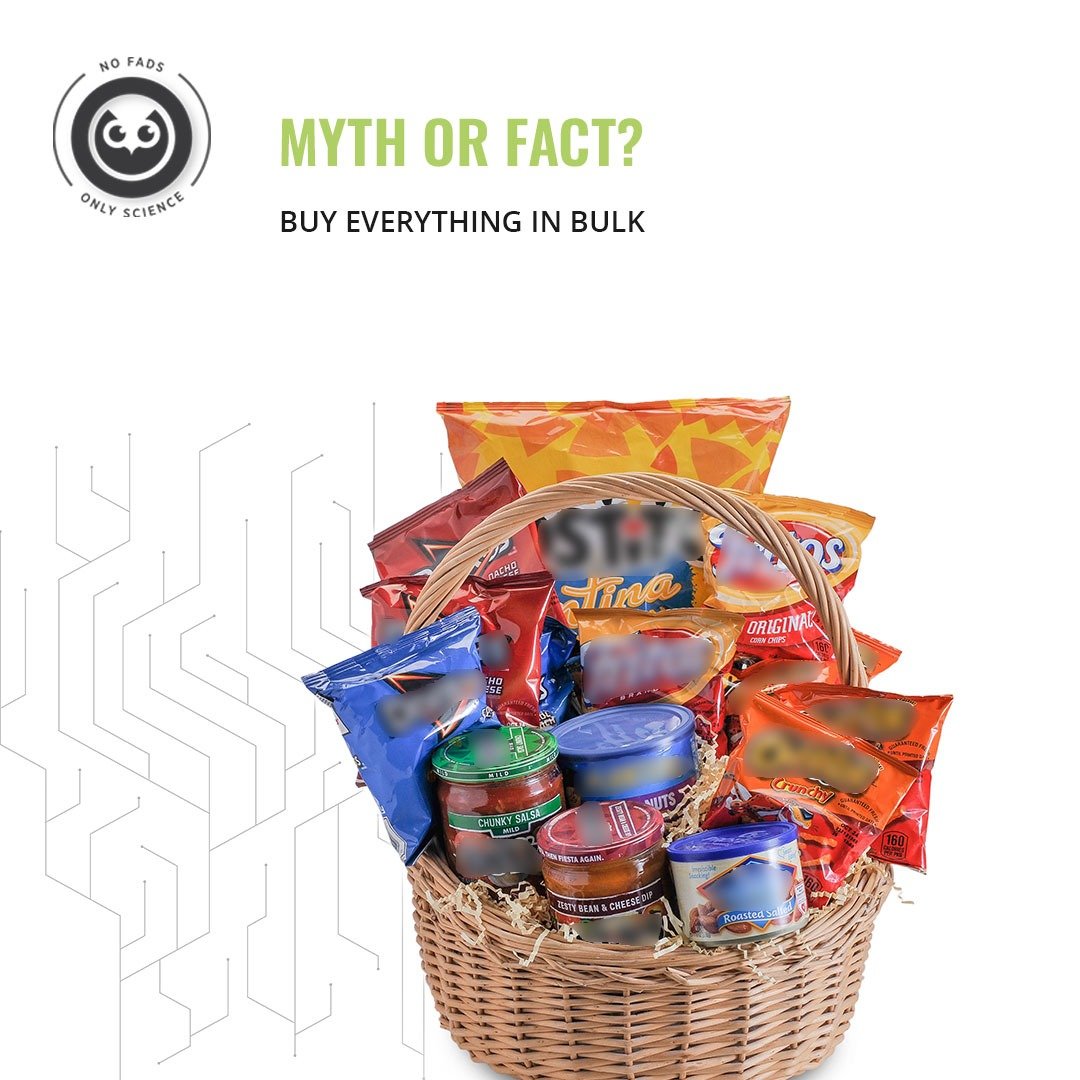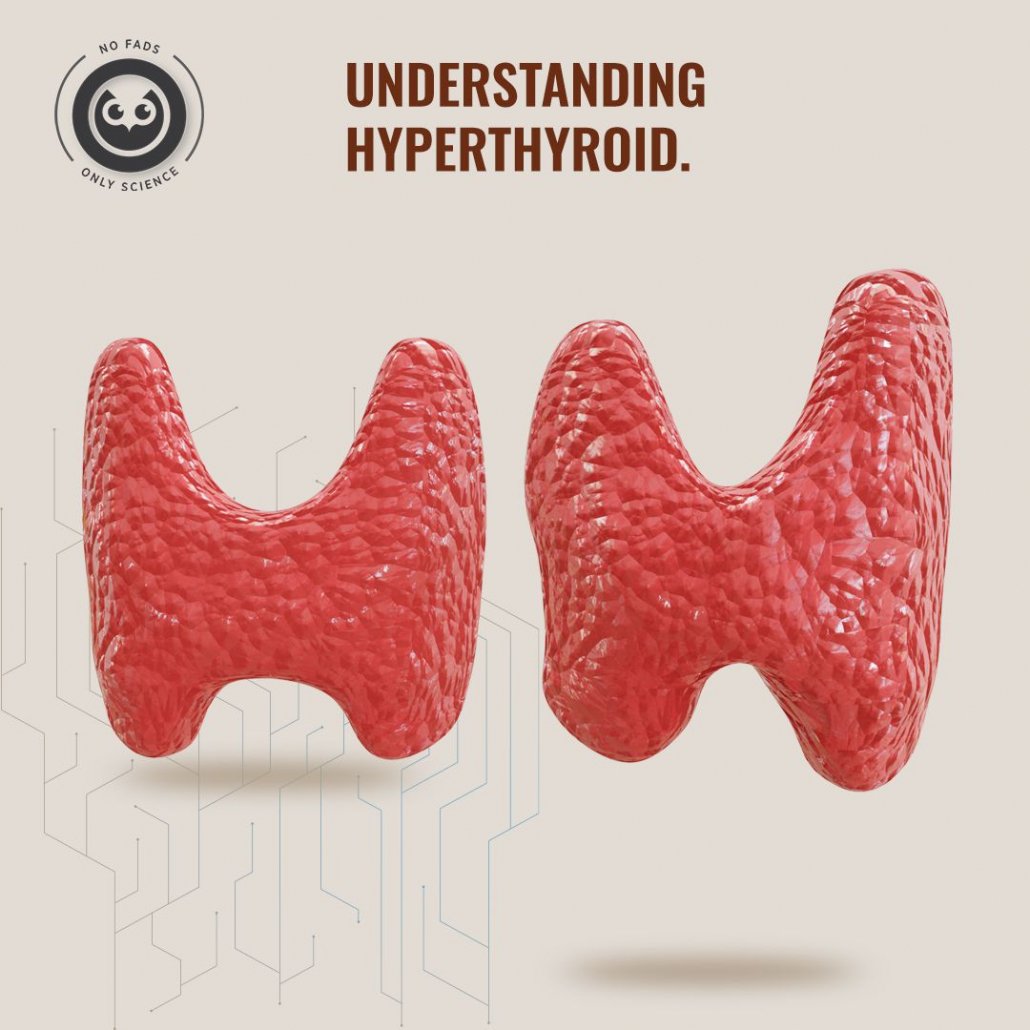If you are someone looking for a nutritionist’s guidance and find yourself encountering terms you don’t understand, you have come to the right place.
The nutritionist might tell you many things in Greek and Latin and you might be confused. It is true that some of our clients feel the same way when we suggest they take supplements to combat deficiencies. When we explain to them that they aren’t allergic but intolerant, they seem to get a tad confused. It is also possible that some people have a misconception about processed foods.
By understanding the most commonly used terminologies and their differences, you will be better able to understand what you eat and what your nutritionist recommends.
- NUTRIENT VS FOOD
Most of us confuse the terms nutrient and nutrition. The term nutrition encompasses the term nutrient.
Nutrients – are substances that are required for the nourishment of organisms while
Nutrition – is the entire process by which organisms obtain energy and nutrients from food.
We might also think food and nutrients are the same.
Food is the source of energy that helps our body to function properly and stay alive.
Nutrients are a part of food, which are used and metabolized by our body cells to provide energy.
Example: Fruit is your food and the vitamins and minerals in it are the nutrients.
Recipe – Smoothie is the food, the carbs, vitamins, minerals, protein, and fat we get from the ingredients are the nutrients.

- ALLERGY VS INTOLERANCE
It is possible to experience adverse reactions after eating certain foods.
These reactions can be categorized as immunologic (allergic) and non-immunologic (intolerance).
Many people mistake food intolerance for allergy as one of its symptoms is allergy-like reactions.
Allergy:
- Allergies occur when the body’s immune system responds or overreacts to a particular type of protein.
- This protein is usually from foods, pollens, house dust, animal hair, or moulds and they are called allergens.
- During allergy, our body produces antibodies to defend substances that are usually harmless.
Intolerance:
Food intolerances arise if the body is unable to digest a certain food. This impairment may be due to a lack of digestive enzymes or a sensitivity to certain chemicals.
Food intolerance refers to the body’s inability to digest certain chemicals in food due to lack of enzymes or sensitivity to the chemical.
- These are chemical reactions that occur that are not immune responses.
- This often happens when we can’t properly digest particular food or its components.
- Food intolerances are uniquely individualized.
Food allergy is more severe and fatal than food intolerances.
Example for allergy: Peanut allergy or shellfish allergy – A person who is allergic to peanut or shellfish, and eats one of these could even die without medical assistance.
Symptoms: can start with rashes, hives, and itching and can develop into fatal symptoms like dilation of blood vessels, drop in blood pressure, etc.
Example of food intolerance: It mostly occurs from enzyme deficiency.
Many people can be lactose intolerant – they won’t have the enzyme lactase which is necessary to digest lactose, the main sugar in milk.
Symptoms: nausea, vomiting, diarrhea, headache, etc.
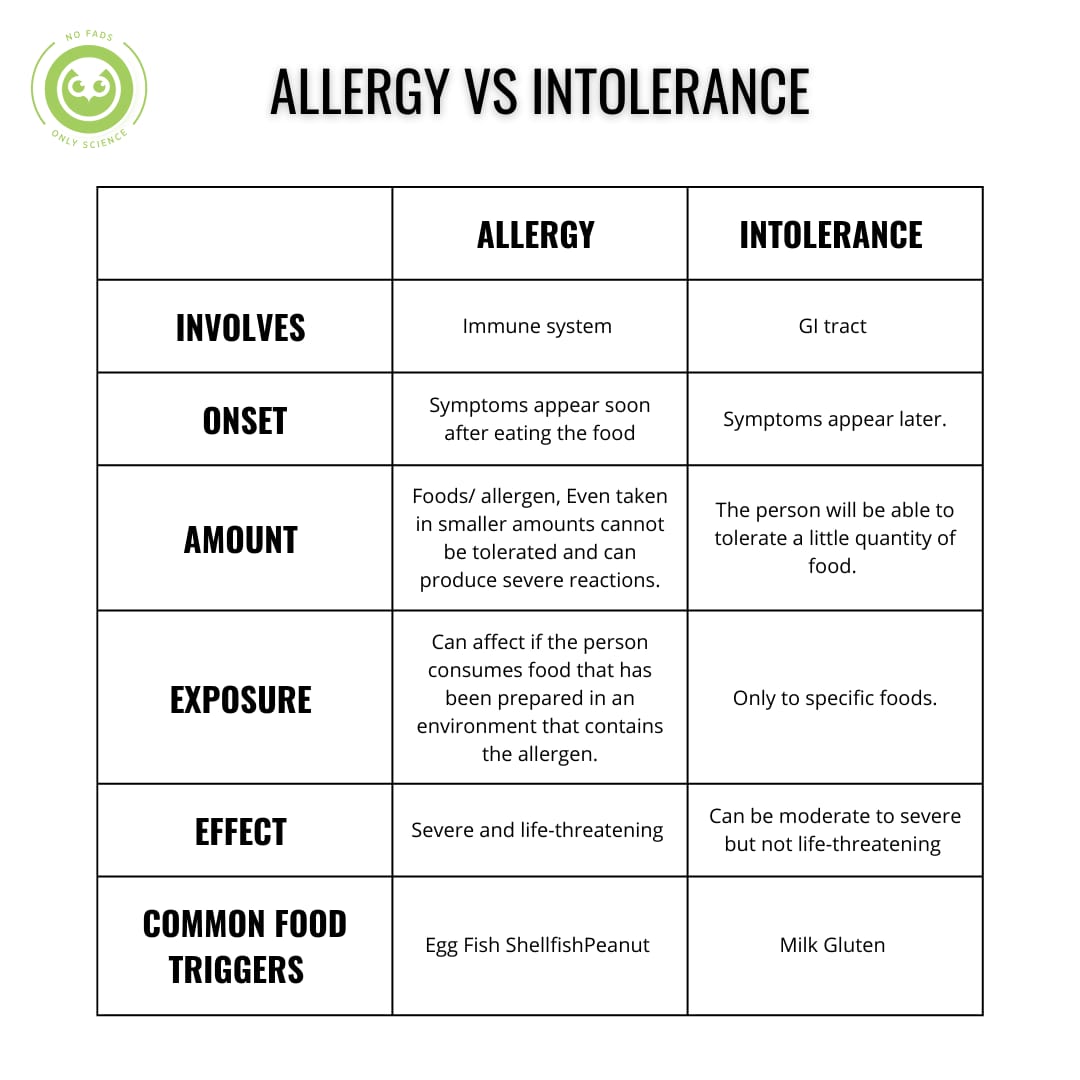
- PROCESSED VS ULTRA-PROCESSED
The newest trend buzzing around among people is “saying NO to processed food”.
But one must understand that food does not make it from the farm to the fork unprocessed.
Even the fruits that we eat require some processing before they reach our plates.
Choosing minimally processed foods is probably a better option than ultra-processed foods.
Processing: Processing is anything that alters the fundamental nature of agricultural produce, such as freezing, dicing, drying, etc.
- The nutrients in these foods will still be intact.
Example: The milk we drink daily requires processing such as pasteurization to extend its shelf life.
Ultra processing: A technique that converts agricultural produce into an entirely different form is known as ultra processing.
Highly processed foods, also known as ultra-processed foods, are relatively cheap, convenient, and tasty but contain a lot of refined carbohydrates, saturated fat, and salt.
- They could also be referred to as hyper-palatable foods.
Example: Potato chips, bread, soft drinks, etc.
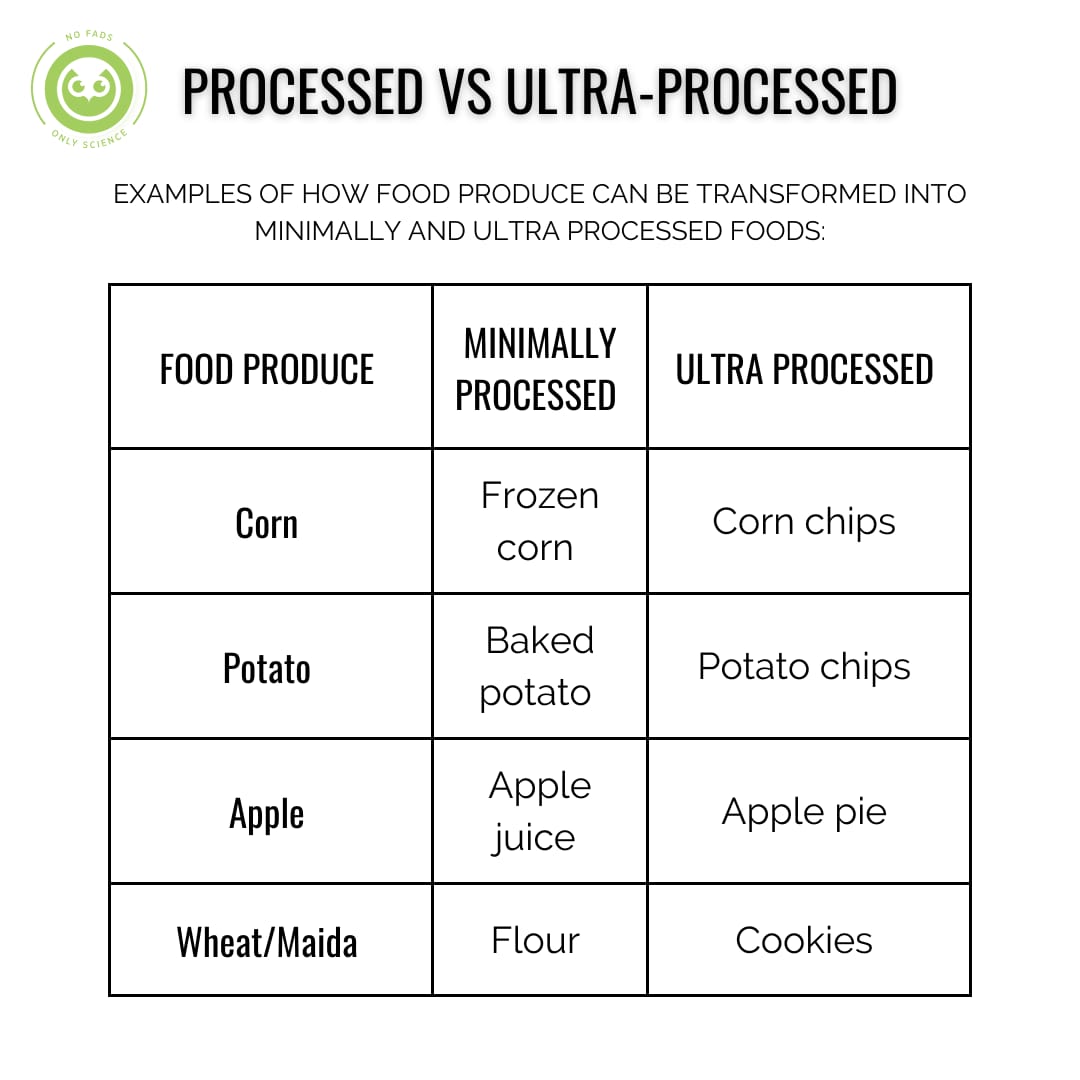
- SUPPLEMENTS VS MEDICINE
DIETARY SUPPLEMENTS: A dietary supplement is a vitamin, mineral, herb, or nutrient that a person takes to treat or combat nutritional deficiencies, improve their overall well-being, or improve their overall wellness.
Dietary supplement labels may make certain health-related claims, but they are not intended to treat or cure any specific disease. Dietary supplements are generally safe to consume and cause no adverse reactions.
MEDICINE: This is a preparation or substance used to treat a particular disease and ease symptoms. Several chemicals are mixed together in laboratories to produce medicines.
For example, fish oil that we consume to lower the cholesterol level is a supplement and the fever medication that we get only with a doctor’s prescription is medicine.
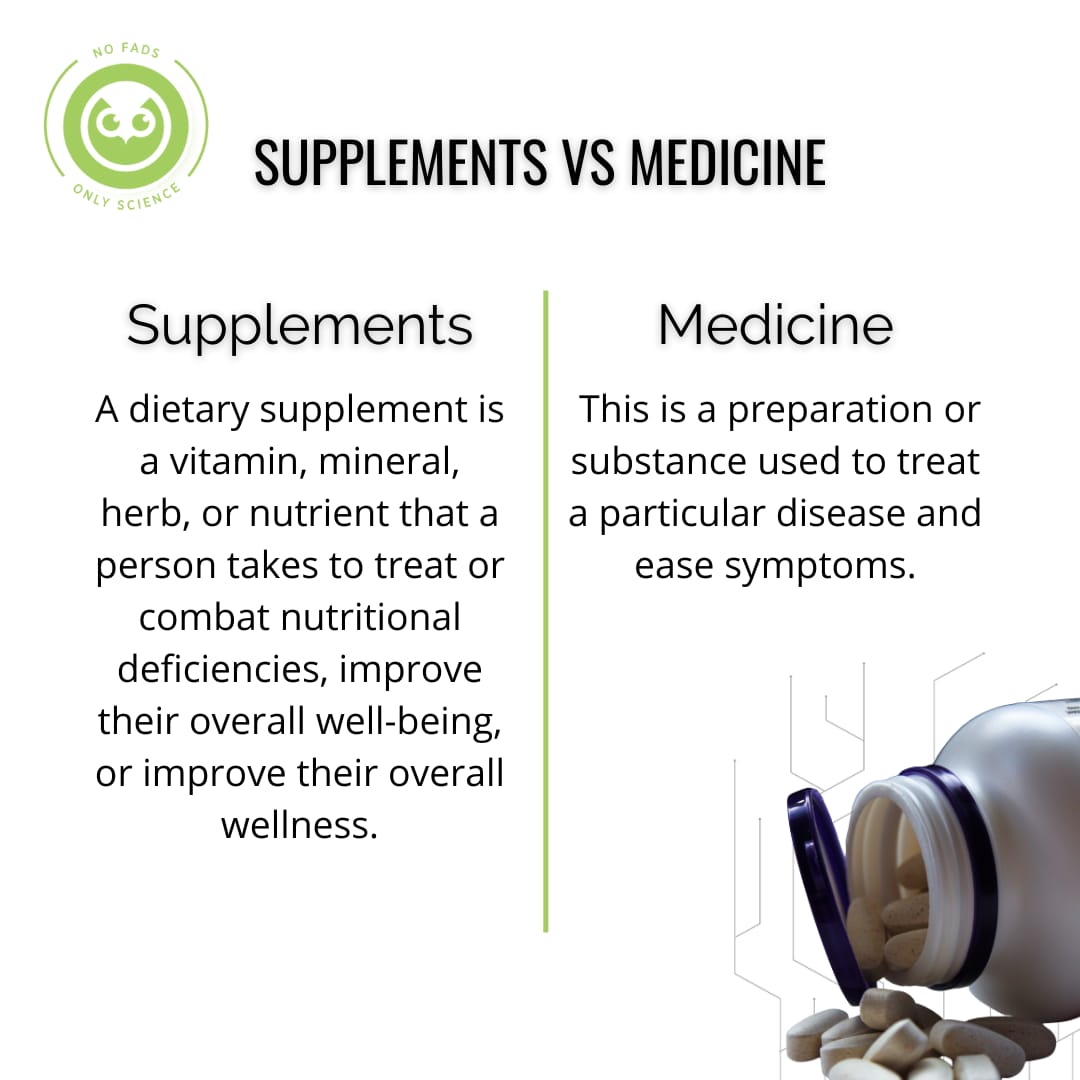
- COD LIVER OIL VS FISH OIL
COD LIVER OIL – as the name suggests, it’s derived from codfish livers.
The oils in these fish tend to build up in the liver, and they also contain high levels of vitamins A and D.
FISH OIL – Fish oil comes from the flesh of fatty fishes such as tuna, mackerel, and salmon.
This results in higher concentrations of EPA and DHA.
Fish oil doesn’t contain Vitamin A or D.
However, cod liver oil often contains a lower concentration of omega 3’s when compared to omega 3 fish oil.
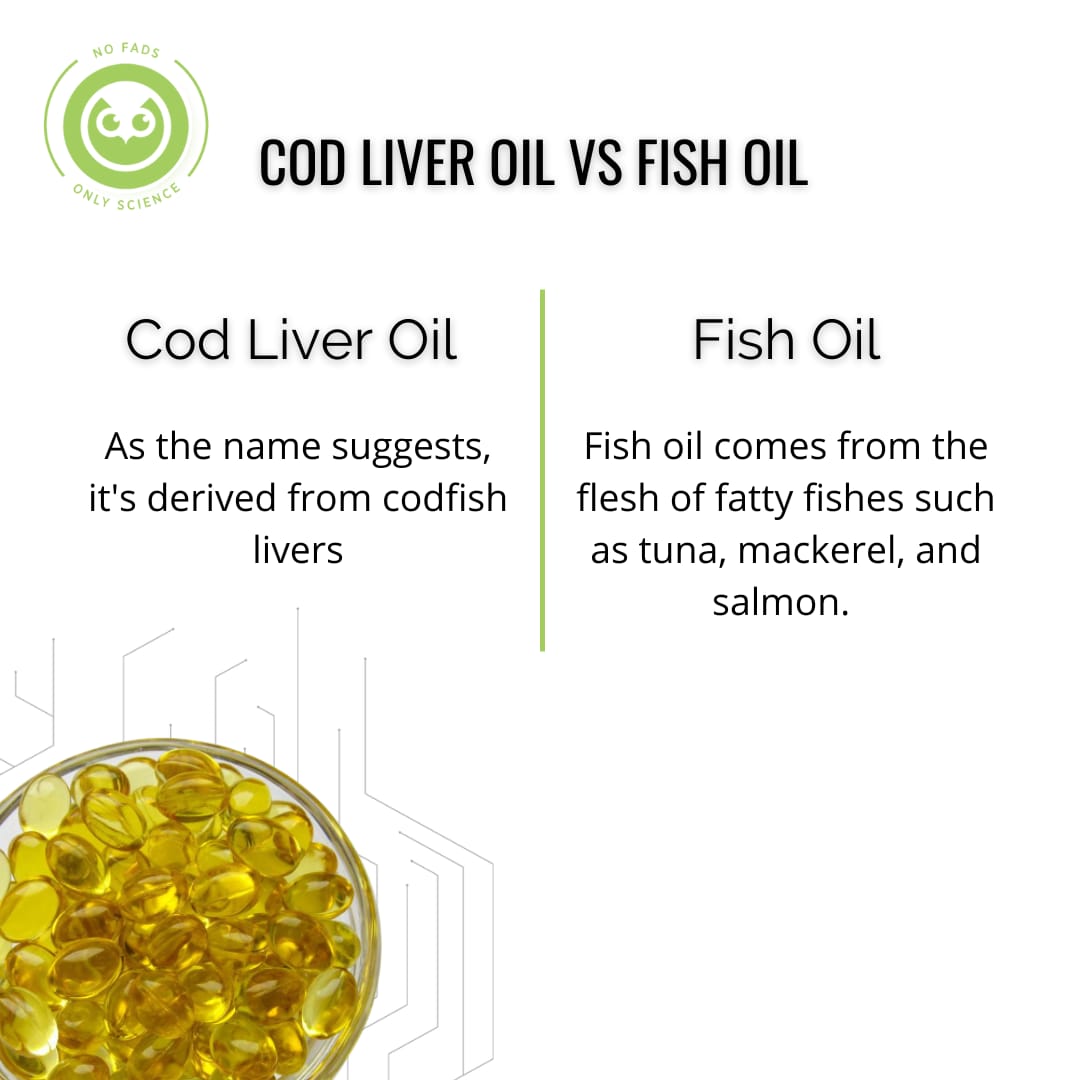
- SATURATED FAT VS TRANS FAT
SATURATED FATS: Saturated fat is solid at room temperature due to its chemical structure.
Foods high in saturated fats tend to be high in cholesterol, hence consuming foods rich in saturated fats tends to cause more diseases.
It has also been found that foods containing saturated fats are highly processed and contain more sugar and sodium which might have an effect on our body.
Therefore, saturated fats should always be balanced with other types of fats such as MUFA and PUFA.
Example: butter, cream, cheese, coconut, etc.
TRANS FAT: Trans fat comes from industrial fat processing where saturated or unsaturated fats are processed by adding hydrogen ions to them.
Trans fats are also solid at room temperature.
The process of adding hydrogen ions is known as hydrogenation and they extend the shelf life of the product.
Example: margarine, shortenings, etc.
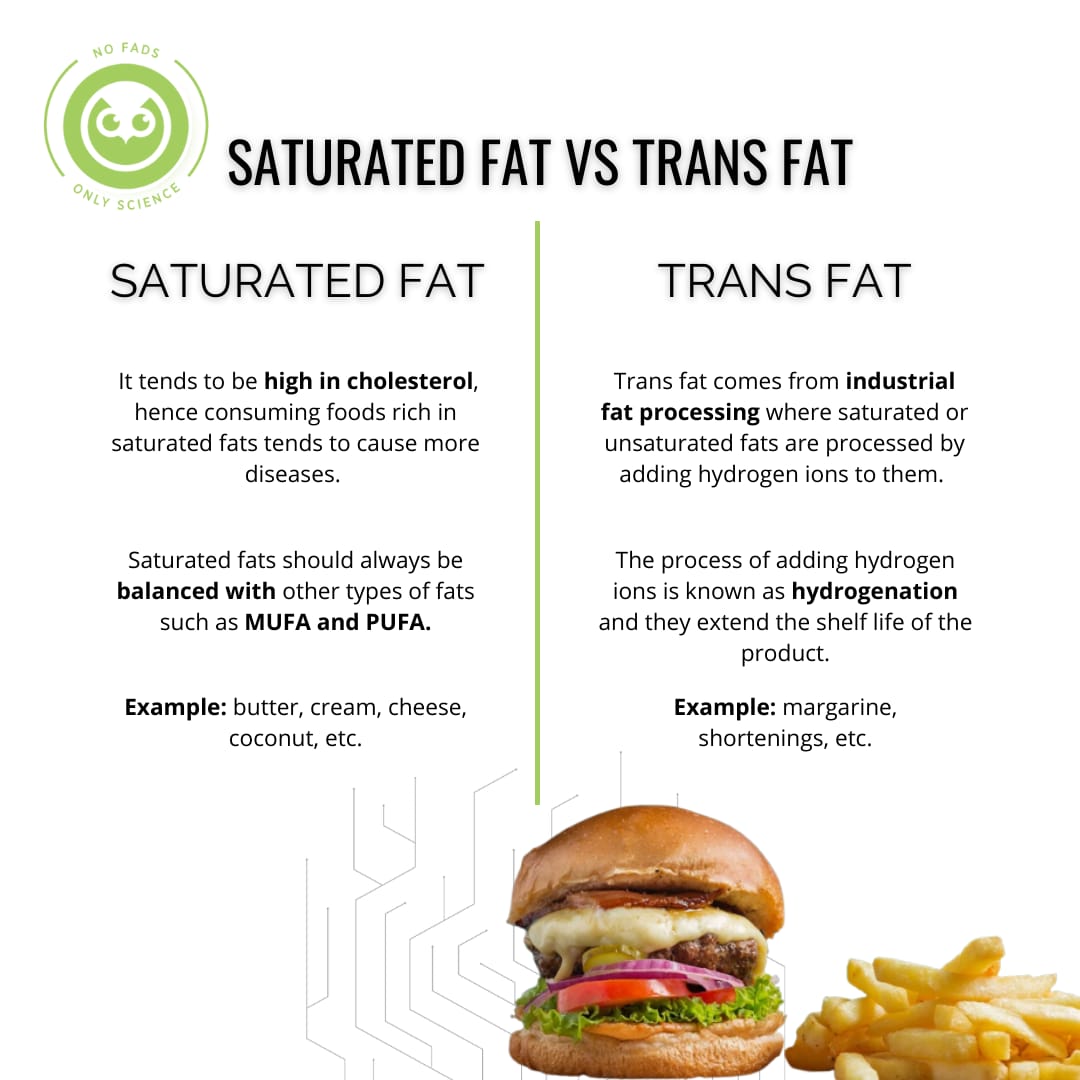
When we talk about nutrition, we often hear the following statements. We even hear some of these statements every day. But how true are they?
In this article, we will debunk 6 such statements:
- FLAX SEEDS ARE THE RICHEST SOURCE OF OMEGA-3 FATTY ACIDS.
Our common perception is that flax seeds are rich in omega-3 fatty acids.
But in reality, they are a rich source of fiber, but not the best source of omega-3.
The omega-3 fatty acid found in flax seeds is ALA (Alpha-linolenic acid), which our bodies cannot convert to EPA/DHA.
Therefore, the most ideal choice is to consume EPA/DHA-containing foods such as fatty fish, salmon, tuna, etc.
- NOT EVERYONE NEEDS A GLUTEN-FREE DIET
Gluten is a type of protein found in wheat, maida, and rye which is responsible for the elasticity of these flours.
So, WHO NEEDS A GLUTEN-FREE DIET?
Individuals with celiac disease or individuals with gluten sensitivity or those who can’t tolerate even small amounts of the protein gluten should go gluten-free.
If you are not gluten sensitive or have celiac disease, eliminating gluten from your diet can cause nutritional deficiencies.
- EGGS ARE HEALTHY AND GOOD FOR CHOLESTEROL
Eggs are an economical and easily available source of high-quality protein which is a key source of many essential nutrients.
Cholesterol is a waxy substance that is produced majorly in our body, forms an important part of our cells and is very important for the proper functioning of our body.
While cholesterol is important for body functions, high amounts can lead to heart problems.
But however not all cholesterol is bad, the cholesterol that comes from the foods you eat has a minimal impact because the body naturally regulates the amount of cholesterol that circulates in the blood.
WHAT HAPPENS IN AN EGG?
For many years now, we all have been thinking that egg yolk is full of saturated fat. But, the truth is that the major fat portion in eggs comes from MUFA and PUFA.
Saturated fats when consumed along with MUFA and PUFA don’t show to have much effect on cholesterol.
Also, if you are still not convinced and are skeptical about consuming whole eggs daily, remember that consuming saturated fats along with lots of ultra-processed foods/refined carbohydrates is unhealthy.
Instead include eggs as a part of your healthy diet along with fruits, vegetables, and whole grains.
- LATE-NIGHT EATING WILL MAKE YOU GAIN WEIGHT.
Many people think eating late at night will make them fat but the truth is it doesn’t.
According to science, a calorie is a calorie taken regardless of the time.
What causes weight gain is the type of food you eat and the number of calories you eat.
Most studies suggest that nighttime eaters mostly make poor choices of food.
Studies show that most people who eat late at night binge eat to keep them awake, for this they rely on hyper-palatable foods that are high in sugar and fats that have low satiety value and make them eat more.
The second most important point is that the calories that go in from the hyper-palatable foods must be burned out, if not definitely it will make them gain weight.
VERDICT – Eating late at night is not bad but the type of food we eat matters the most and the calories we eat must be within the limits.
- IS IT OKAY TO SKIP YOUR BREAKFAST?
For most of our lives, breakfast has often been dubbed “BREAKING THE FAST” and is considered one of the most important meals of the day.
They say skipping breakfast might lead you to overeat later in the day.
But, this is not true.
Also, it may not cause you to eat less either. It definitely depends on the individual.
If you are taking appropriate amounts of calories and nutrients throughout the day, skipping breakfast won’t make much difference.
- A DETOX DIET IS IMPORTANT
A detox diet – is a more popular diet trend that claims to detox/ clean our body and eliminates harmful toxins from our body.
A typical detox diet involves a period of fasting followed by a diet that includes only fruits, vegetables, fruit juices, and water. Sometimes it might also include herbs, teas, and enema.
THE TRUTH – our body doesn’t need any detox program or diet, it’s naturally designed to detox itself. Our organs such as the liver, kidney, and lungs are detoxification machines that are naturally designed to get rid of the toxins from our body.
That means maintaining a healthy diet is important in order to maintain the proper functioning of these organs.
THE CON – The detox diets can also be dangerous since they include only a particular type of food group and avoid most of them and can cause nutritional deficiencies, electrolyte imbalances, and other problems.




